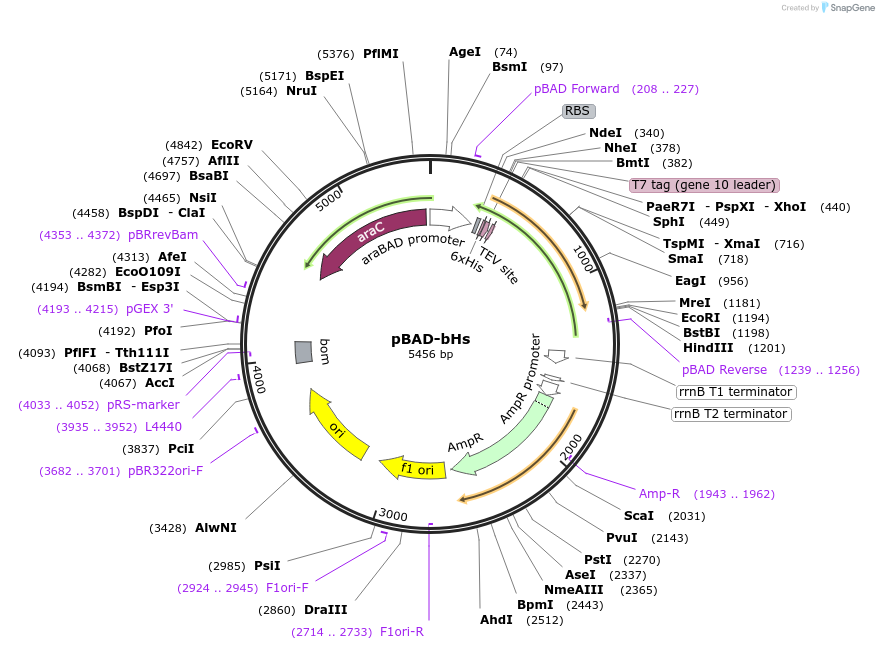pBAD-bHs
(Plasmid
#134259)
-
PurposeFor L-arabinose inducible bacterial expression of S. typhimurium codon-optimized hyaluronidase (Streptomyces koganeinsis UniProt A0A0U2E2) with N-terminal 6x His tag
-
Depositing Lab
-
Sequence Information
Ordering
| Item | Catalog # | Description | Quantity | Price (USD) | |
|---|---|---|---|---|---|
| Plasmid | 134259 | Standard format: Plasmid sent in bacteria as agar stab | 1 | $85 | |
Backbone
-
Vector backboneEGFP-pBAD
-
Backbone manufacturerMichael Davidson (Addgene #54762)
- Backbone size w/o insert (bp) 4698
- Total vector size (bp) 5467
-
Modifications to backboneEGFP removed by XhoI-EcoRI digest
-
Vector typeBacterial Expression
Growth in Bacteria
-
Bacterial Resistance(s)Ampicillin, 100 μg/mL
-
Growth Temperature37°C
-
Growth Strain(s)DH5alpha
-
Copy numberUnknown
Gene/Insert
-
Gene/Insert nameHyaluronidase from Streptomyces koganeinsis codon-optimized for Salmonella typhimurium
-
Alt namebHs
-
SpeciesSynthetic; Streptomyces koganeinsis
-
Insert Size (bp)759
-
Mutationcodon optimized for Salmonella typhimurium
- Promoter AraC
-
Tag
/ Fusion Protein
- 6x His (N terminal on insert)
Cloning Information
- Cloning method Restriction Enzyme
- 5′ cloning site XhoI (not destroyed)
- 3′ cloning site EcoRI (not destroyed)
- 5′ sequencing primer TATTTATACTCGAGCATGCCGGTTGCGCGTCGTCTG
- 3′ sequencing primer TATTTATAGAATTCTCATTACGCCGGCGCGATGGTGGTAAC (Common Sequencing Primers)
Terms and Licenses
-
Academic/Nonprofit Terms
-
Industry Terms
- Not Available to Industry
Trademarks:
- Zeocin® is an InvivoGen trademark.
These plasmids were created by your colleagues. Please acknowledge the Principal Investigator, cite the article in which the plasmids were described, and include Addgene in the Materials and Methods of your future publications.
-
For your Materials & Methods section:
pBAD-bHs was a gift from Edwin Manuel (Addgene plasmid # 134259 ; http://n2t.net/addgene:134259 ; RRID:Addgene_134259) -
For your References section:
Hyaluronidase-Expressing Salmonella Effectively Targets Tumor-Associated Hyaluronic Acid in Pancreatic Ductal Adenocarcinoma. Ebelt ND, Zuniga E, Passi KB, Sobocinski LJ, Manuel ER. Mol Cancer Ther. 2019 Nov 6. pii: 1535-7163.MCT-19-0556. doi: 10.1158/1535-7163.MCT-19-0556. 10.1158/1535-7163.MCT-19-0556 PubMed 31694889





